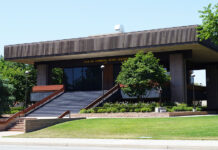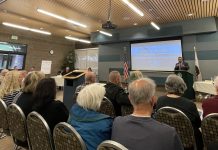Facing a barrage of red ink, the city council of Los Alamitos voted 5-0 this week to put the financial fate of the city into the hands of voters.
Accordingly, voters in November will now have an option to levy a 1.5 percent sales tax that city leaders say is critical to the future of Los Alamitos.
“Waiting for this to go away is not an option,” said city manager Chet Simmons, as the Council methodically debated the proposed measure that they hope will return fiscal sustainability to the city.
After years of budget cuts and other money saving attempts to mitigate its deepening financial crisis, the city voted on Monday to ask voters to approve a 1.5 percent sales tax to effectively return the city to fiscal sustainability.
“I don’t want it (the ballot measure) to be misleading or have loopholes,” said council member Shelley Hasselbrink, a member of the Budget Sustainability Committee. Together with Mayor Pro-Tem Mark Chirco, the budget sustainability committee has worked with city officials, staff, consultants, and outside agencies over the past two years to develop an accurate representation of the city’s financial position.
Moreover, the entire council has, for the past year, held public meetings and forums with to interact with citizens and to inform them that city’s financial position is bleak.
During those meetings, the council eventually eliminated a series of other potential revenue measures as for one reason or another, voters told the council that they believe a sales tax would be most palatable.
Without intervention, however, this tight knit community is headed for bankruptcy or similar destination, they told those attending.
The city has made significant budget cuts (see related story) to make up this year’s $1.4 million budget gap, but without additional revenue enhancement, officials say the shortfalls will grow to $3 million a year and by 2025, exhaust the city’s entire reserve fund.
“The presentations clearly show expenses will outpace revenues,” said Simmons, citing a number of developments that have brought the city to this point. “We are looking at some very dire circumstances,” he said, “unless we are able to take some serious action.”
Before the vote, the council heard from a research firm representative whose firm surveyed city residents about the tax.
Adam Sonensheim, Vice President of FM3 Research, told the council that taxpayers in the city would support a 1.5 percent measure just about as much as 1 percent.
Also, he said residents now feel like the current council has the city “headed in the right direction.”
The state sales tax threshold is 7.25 percent, Simmons told the council, yet the state gives local governments an additional two percent for local needs.
When council members learned that a state agency, the Orange County Transportation Authority has already grabbed one-half cent of that authority, they began to discuss the urgency of utilizing the entire remaining authority of 1.5 percent before another entity of local government does so.
Under the current situation, the city’s everyday operations are strained and it has no funding for capital improvement projects, the city manager said.
Without additional revenue, the city cannot guarantee retaining the city’s unique qualify of life in the years ahead, he suggested.
If approved, the new sales tax will generate approximately $4.1 million annually, which officials say would allow the city not only to retain all city services and its quality of life but would allow for some limited capital improvement projects.
Officials acknowledge, however, there are economic uncertainties due the unknown impact of the pandemic.
Mayor Richard D. Murphy said he thought it was critical to emphasize the city’s “quality of life” in the wording as the Council spent time going through the wording and explanation of what voters will see.
Council member Tonya Doby thought it to be a good idea to include police in the description and council member Dean Grose suggested ideas to eliminate duplications.
Hasselbrink suggested forming some form of additional transparency mechanism to allow voters to be sure the funds, if approved, would be spent on exactly what has been proposed in the offering.
City attorney Michael Daudt made some suggestions but said it should be done later so the motions drawn up by staff could proceed as written.
Hasselbrink agreed but said “I want to make sure we’re as transparent as possible,” then moved the recommendation, which was seconded by Doby. It passed 5-0.
In a secondary motion, Murphy moved that Chirco and Hasselbrink, the members of the budget standing committee, should draft the city’s arguments for the tax. The motion passed and will be brought back before the Council later.
The measure will be called the “City of Los Alamitos qualify of life, 911 police response, business/job protection measure.”
The council finally agreed on the exact wording of the ballot measure, which is limited to 75 words.
Arguably, these could become the most important words in the city’s recent history as taxpayers go to the polls to decide the financial fate of the city.












